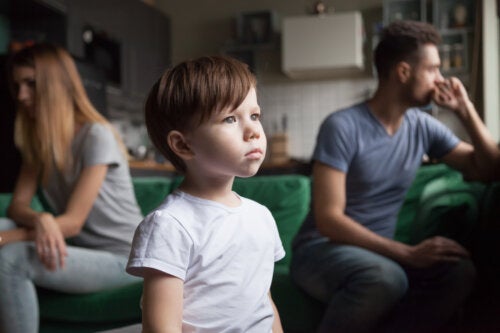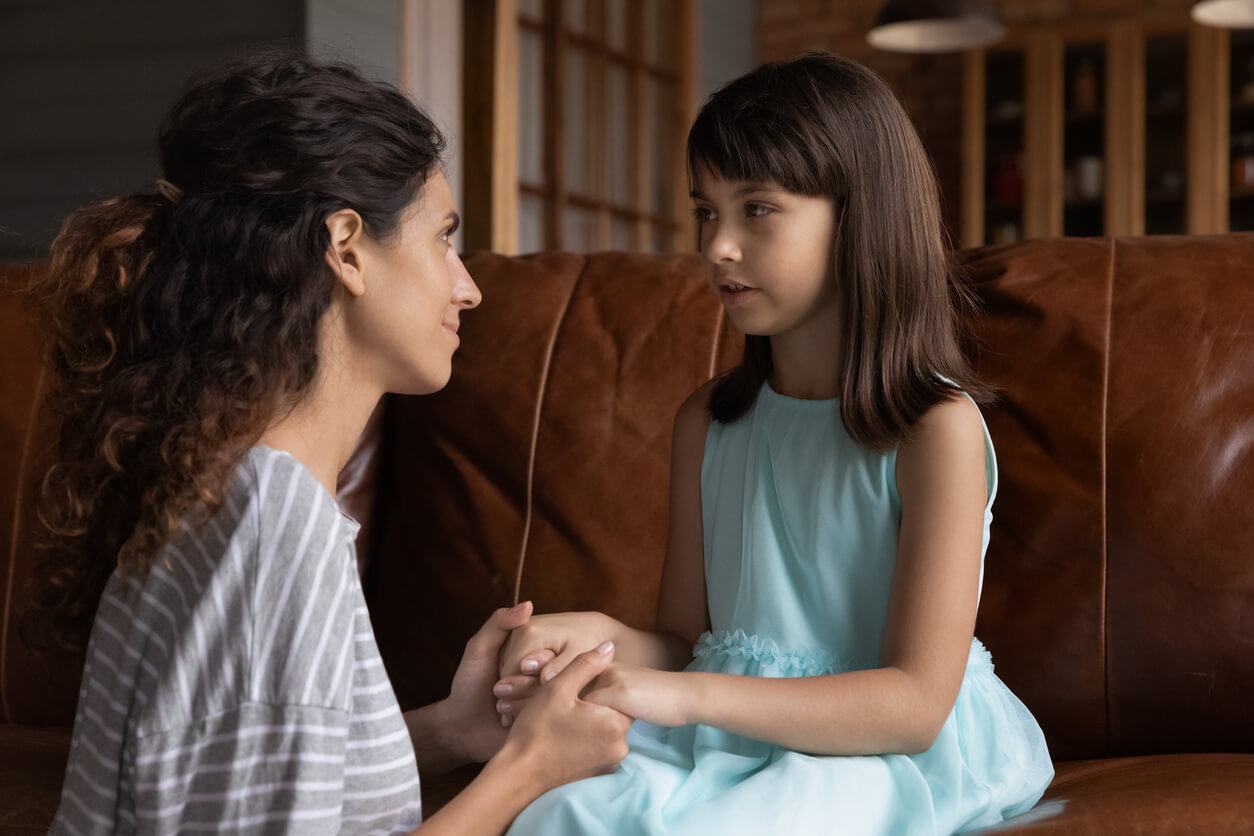Growing Up with Separated Parents: Difficulties and Consequences

Does growing up with separated parents have consequences for children? This is a very common question asked by couples when faced with this possibility. We can say that separation and divorce always have psychological consequences on the children, but sometimes trying to sustain the relationship when things aren’t going well can be even more harmful.
All parents, when faced with the decision to separate, ask themselves questions such as Will it affect their performance? Will they be happy? Will we lose the bond we have with them? It’s clear that separation is going to be a grieving process and, as such, it requires a period of adaptation. The important thing is that we find other ways to function as a family.
The difficulties of growing up with separated parents
When parents separate, their children have to face changes in their routines and daily life. This creates difficulties that they eventually overcome as they become accustomed to their new way of life. Some of the difficulties they have to face are the following:
- When the separation is conflictive, they may not see some of their relatives, such as grandparents, aunts, uncles, or cousins. However, a separation between parents shouldn’t imply separation from the family.
- Their parents’ arguments in front of them before initiating the divorce can cause them a lot of psychological damage.
- Sometimes, parents think more about their disagreements than about the well-being of their children. It’s important to keep in mind that children need affection, understanding, and love.
- After a contentious divorce, parents try to turn their children against the other parent. This is a difficulty that children have to face and that seriously harms them. The relationship between adults shouldn’t be transferred to the child as a form of revenge.

Know what the consequences of growing up with separated parents are
A separation, no matter how amicable it may be, will have psychological consequences on the children. These won’t last forever, but they’ll remain while they’re in the process of adapting to the new situation. Once they settle into their new life and new routines, everything will normalize. In the meantime, the children may go through a stressful and slow process. Let’s take a look at some of the consequences of growing up with separated parents.
Consequences by age
Much will depend on the age of the child’s adaptation. In the youngest children, behavioral imbalances may be observed, such as sleeping problems , regression, or feeding problems, among others. In older children, there may be social difficulties such as embarrassment, self-blame, or isolation.
- Separation during pregnancy: The baby may be born with low birth weight or delayed cognitive development.
- In children from 1 to 3 years old: Phobias or nightmares may occur.
- Children from 3 to 6 years old: Behavioral problems and aggressive or passive reactions.
- Children 6 to 9 years old: May feel separation as a form of rejection and have a sense of loss.
- From 9 to 12 years old: They may have feelings of rage, fury, and angry reactions.
- From 12 to 18 years: Defiant or antisocial behaviors may appear.
Emotional and behavioral consequences
The emotional consequences will depend on each particular case. For example, if the child witnesses their parents’ arguments, if there’s abuse at home, or the child suffers abandonment, among others. All this will produce different changes in the child. Other factors that may also have an influence are the following:
- Financial support: if one of the parents doesn’t take care of the child financially, the child may also suffer the consequences when it comes to their basic needs.
- Compliance with the visitation regime: If one of the parents doesn’t comply with the agreed visitation regime, it will produce a feeling of neglect and contempt in the child. This happens in the same way if the parent with whom the child lives doesn’t give the child the attention that the visiting parent does.
- Personality: It also depends on the character of each child. Some children tend to be easily frustrated or find it more difficult to handle stressful situations. Their personality will be a key factor in the way they deal with these new feelings that appear.

Consequences regarding academic performance
Yes, it has been observed that the children of separated parents tend to have a lower performance, but this isn’t something that lasts over time. This occurs in the initial stages of adaptation and usually lasts up to a year later. In younger children, learning problems can be observed, while in the older ones, there may be a lack of motivation and interest in academic matters.
Children need understanding and affection
As you’ve seen, growing up with separated parents is sometimes better than living with them together and having repeated shouting and arguments. Even so, we can’t forget that growing up with separated parents still has consequences for the children.
It’s important not to forget that children, when their parents separate, will undergo a grieving process, to which they have to adapt. As parents, we have to make it as easy as possible, giving them understanding and affection, independently of the relationship we have with their father or mother.
All cited sources were thoroughly reviewed by our team to ensure their quality, reliability, currency, and validity. The bibliography of this article was considered reliable and of academic or scientific accuracy.
- Cantón, J., Cortés, M.R., y Justicia, M.D. (2002). Las consecuencias del divorcio en los hijos. Psicopatología Clínica, Legal y Forense, 2(3), 47-66.
- Novo, M., Arce, R., y Rodríguez, M.J. (2003). Separación conyugal: consecuencias y reacciones postdivorcio de los hijos. Revista Galego-Portuguesa de Psicoloxía y Educación, 10(8), 197-204.
